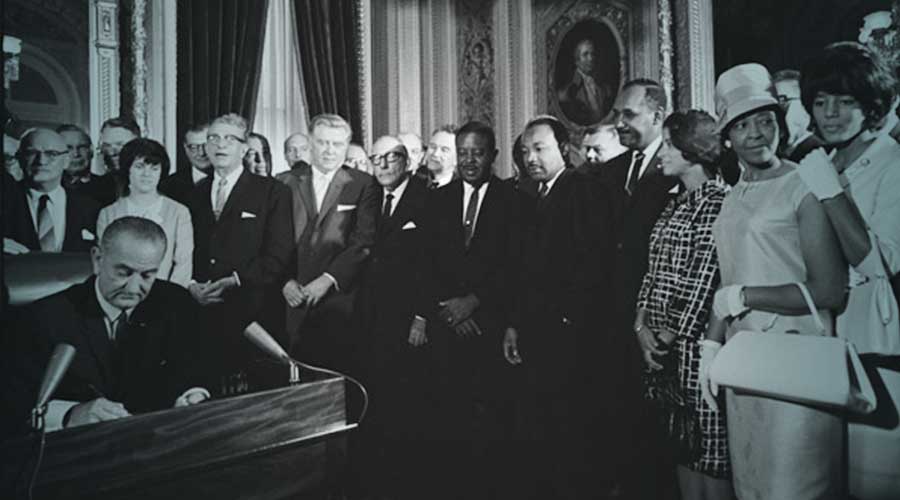August 6, 2021 marks the 56th anniversary of the passage of the Voting Rights Act, a landmark piece of civil rights legislation signed into law by President Lyndon B. Johnson in 1965. The law ensured that state and local governments could not deny American citizens the equal right to vote based on their race, color or membership in a minority language group. By protecting voters of color, the effort enfranchised millions of Americans, thus strengthening democracy at-large.
However, a 2013 Supreme Court decision eroded the law’s impact. In Shelby County v. Holder, the Court invalidated Section 4, which determines the states and localities covered by Section 5, ruling the previous formula to determine which states and localities would be subject to “preclearance” was inaccurate. The ruling allowed states previously covered under Section 5 to pass laws restricting voting rights for these communities.
Lawmakers in states like Georgia and Texas have since proposed, and even passed, restrictive laws to curtail voting access for communities of color. Provisions of these laws include strict ID requirements for absentee ballots, making offering food or water to voters in line a misdemeanor offence, removing many ballot drop boxes, making it more difficult to extend voting hours if problems arise, giving the partisan state legislature power over election authorities and reducing the time permitted to request absentee ballots.
Over 50 years since the original law’s enactment, legislation like the John Lewis Voting Rights Advancement Act would strengthen voting rights by expanding and strengthening the government’s ability to respond to voting discrimination. The bill would modernize the Voting Rights Act’s formula determining which states and localities have a pattern of discrimination and expand the government’s authority to send federal observers to any jurisdiction where there may be a substantial risk of discrimination. The bill has received several key endorsements, including that of moderate Sen. Joe Manchin (D-WV), a critical vote in the current Senate.
Robert F. Smith’s Advocacy to Protect Every Citizen’s Right to Vote
Robert F. Smith has used his platform extensively to lead the fight for voting rights, working to enfranchise voters of color across the country through corporate, political and multimedia advocacy.
Smith is an executive producer and co-founder of Be Woke.Vote, a creative nonpartisan platform for Black voices. The concept began when Smith, film director Deon Taylor, film producer Roxanne Avent and creative director Darrick Angelone found the need to mobilize and empower the youth vote through education initiatives and by creating space to encourage those who are typically disenfranchised to freely discuss politics.
From the Rep Your City Tour to podcasts hosted by the likes of political commentator Van Jones and rapper and community activist Killer Mike, the organization aims to engage Black Gen Z and Millennial voters, as well as providing a culturally rich understanding of the meaning, history and purpose of civic participation.
Smith’s advocacy for voting rights does not end there, however. In March 2021, Smith co-signed a letter condemning a wave of restrictive voting bills being advanced by Republican-controlled legislatures in at least 43 states. Led by Kenneth Chenault, a former chief executive of American Express, and Kenneth Frazier, the chief executive of Merck, dozens of Black executives joined Smith in their discontent for these laws.
“Impeding the right to vote is an assault on democracy,” Smith wrote on Twitter, emphasizing his support for the letter. “No matter our skin color or our political beliefs, we must all agree that the right to vote is foundational to our democracy and who we are.”
Previously, in October 2020, Smith spoke at a virtual ecumenical service of The Conference of National Black Churches, where he asked Black voters to participate in the 2020 election. “History shows us that we have to get in the game. Stay in the game. And do the hard work. We have to do this because the stakes are so overwhelmingly high,” he said.
Smith continued, saying “however you choose to vote, make sure you have a plan. Do it with determination and optimism that things can change and will get better.”
Find out more here about Smith’s support of Be Woke.Vote, his efforts to rally the Black vote, and how the John Lewis Voting Rights Advancement Act would help protect voters from racial discrimination and vote suppression.






